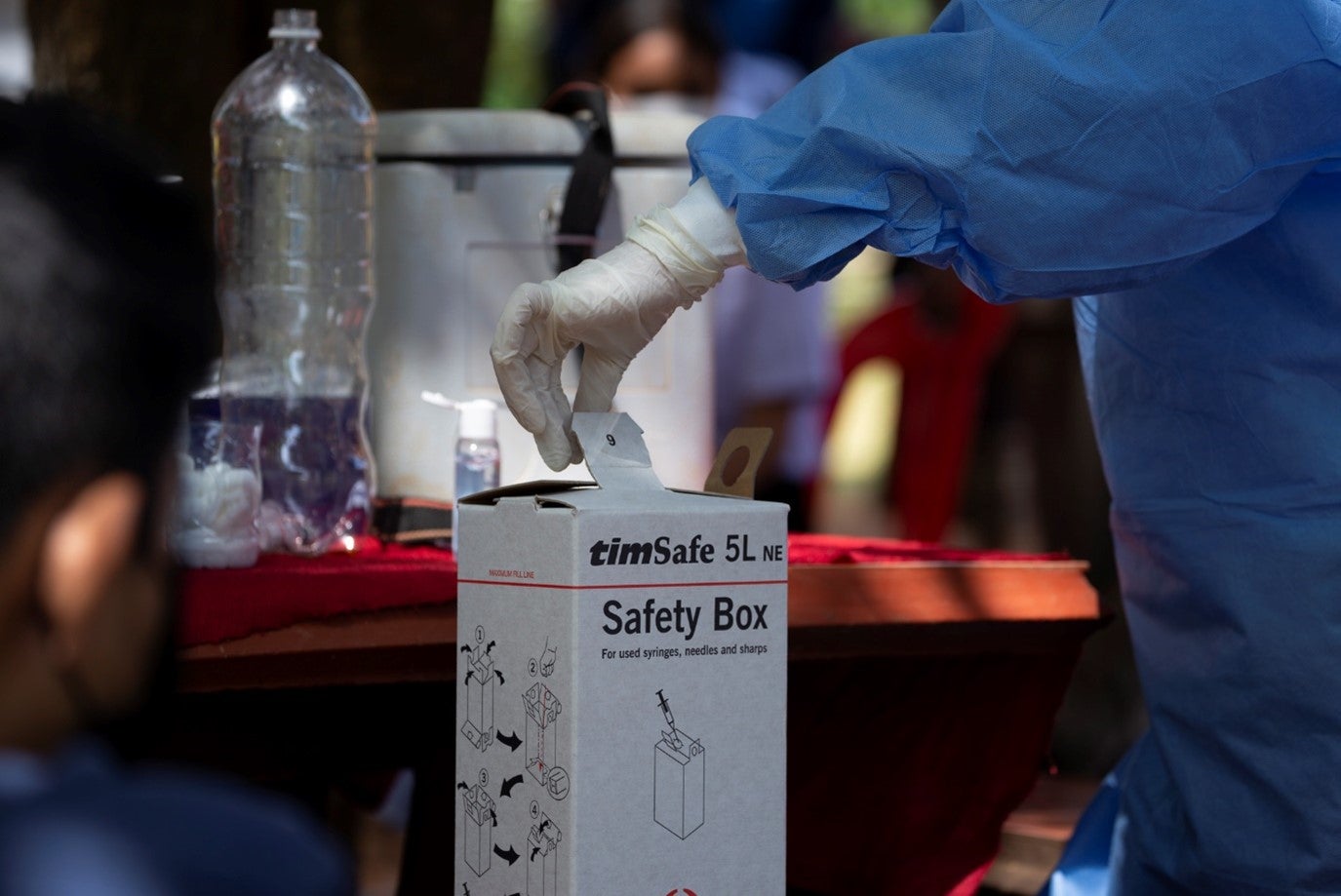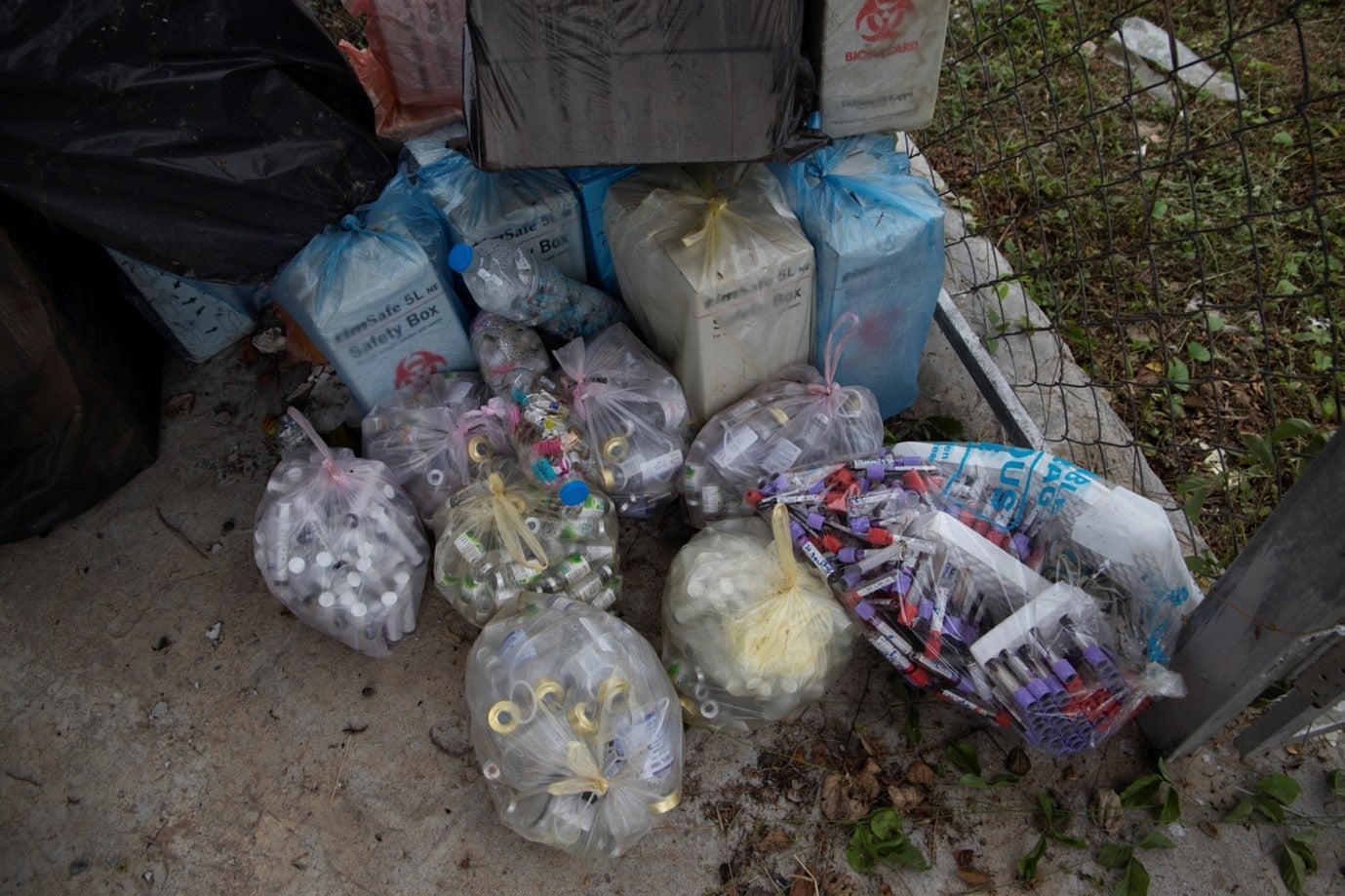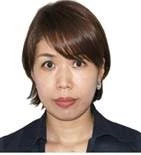 Healthcare facilities at all levels have now started using safe disposal boxes for sharp waste. Photo: HUMA / World Bank
Healthcare facilities at all levels have now started using safe disposal boxes for sharp waste. Photo: HUMA / World Bank
The COVID-19 pandemic caused the volume of healthcare waste — including needles, syringes, vials, contaminated face masks, and wastewater — to soar, intensifying concerns about healthcare waste management. In response, the World Bank leveraged the Health Emergency Preparedness and Response Trust Fund to help the Lao PDR improve healthcare waste and wastewater management through the COVID-19 Emergency Response Project.
Even before the COVID-19 pandemic, Laos struggled to manage its healthcare waste and wastewater. The pandemic exposed this vulnerability, as medical waste piled up outside hospitals and health centers, and contaminated wastewater was discharged directly into the environment. The situation underlined the need for improved healthcare waste and wastewater management systems, and the urgency of resolving this issue before another health emergency arises.
Healthcare waste and wastewater management during the pandemic
The World Bank, together with partners such as the World Health Organization and the Asian Development Bank, assessed healthcare waste and wastewater management at hospitals and health centers across ten Lao provinces. Their results exposed the scale of the problem:
- 24% of hospitals had no COVID-19 waste management, 3% had only partially performing systems, 51% had well-performing systems, and 25% had no data available.
- 70% of hospitals struggled to manage infectious waste, and over half struggled with waste storage.
- Used needles were often disposed of in incinerators that emit toxic fumes.
- Sewage disposal lacked formal processes, with only 30% of provinces practicing chemical waste disinfection and drug waste management.
- Untreated wastewater was regularly discharged into public drains that lead to rivers and can seep into soil, endangering public health.
- COVID-19 treatment and quarantine centers faced the greatest challenges in waste management, because of lack of waste treatment equipment and transportation.
- Healthcare waste was dumped in landfills or left, burned, or buried in healthcare facilities with no safety measures.
The World Bank’s response to the problem
To strengthen healthcare waste and wastewater management systems in preparation for future pandemics and disasters, the World Bank provided short-term support to Laos through the COVID-19 Emergency Response Project and the Health Emergency Preparedness and Response Trust Fund. This project helped the government:
- Assess gaps in healthcare waste and wastewater management and develop national guidelines.
- Set up and equip laboratories in targeted facilities and train health workers to detect contaminating viruses, including COVID-19, and bacteria in wastewater as an early-warning mechanism.
- Install on-site sharp waste pits to safely dispose of used needles.
- Establish on-site waste disposal mechanisms, including autoclaves (steam sterilizers), needle cutters, and waste separation bins.
- Rehabilitate existing healthcare wastewater treatment plants.
- Train healthcare workers and managers on the safe disposal of vaccination waste and overall waste management.
Lessons learned
The pandemic demonstrated the value of investing in healthcare waste and wastewater management infrastructure and in health workers. Lessons learned that could be applied in similar situations elsewhere in the world include the need for the following:
- A robust regulatory framework.
- Enhanced coordination among different ministries and stakeholders.
- The introduction and effective implementation of technical guidelines for healthcare waste and wastewater management.
- Effective monitoring and evaluation systems to track progress, identify challenges, and inform future interventions.
- Awareness-raising and engagement in healthcare waste management efforts.
Medium- to long-term recommendations for managing healthcare waste and wastewater effectively include the following:
- Establish a dedicated regulatory body or institutional mechanism responsible for overseeing healthcare waste and wastewater management. Conduct regular inspections to assess compliance and identify areas in need of improvement.
- Strengthen cooperation between ministries and agencies to improve coordination, share knowledge, and streamline decision making.
- Enhance the ability of healthcare facilities to plan and allocate resources effectively for waste and wastewater management, including maintenance of and upgrades to infrastructure.
- Prioritize investment in healthcare waste and wastewater treatment facilities, and encourage adoption of eco-friendly technologies.
- Launch public awareness campaigns to emphasize safe waste disposal practices and proper waste segregation at the source, particularly among healthcare professionals.
- Promote regional and international cooperation in healthcare waste and wastewater management to facilitate shared learning and enhance readiness for future pandemics and environmental degradation.







Join the Conversation